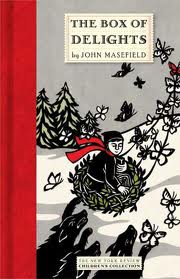Of The Box of Delights, C.S. Lewis said, that it is a unique work and will often be re-read…the beauties, all the 'delights' that keep on emerging from the box—are so exquisite, and quite unlike anything I have seen elsewhere. Those of us who re-read the writings of Lewis would recognize some clear references and allusions to The Box of Delights, especially in Lewis's own The Magician's Nephew.
The Box of Delights was first published in 1935, and was acclaimed and embraced on a popular level. Some place it on the same level of excellence and as perfect for the Christmas season as Charles Dicken's A Christmas Carol. The plot is simple in that it focuses on the adventures of Kay Harker and a gentleman Cole Hawlings who has a magical box that is most desired by a group of criminals. As you assemble your Christmas season reading list, or gifts for children who are burned out on the most recent dystopian series, this is a delightful read that will be enjoyed by those, young or old, open for an enchanting read.
